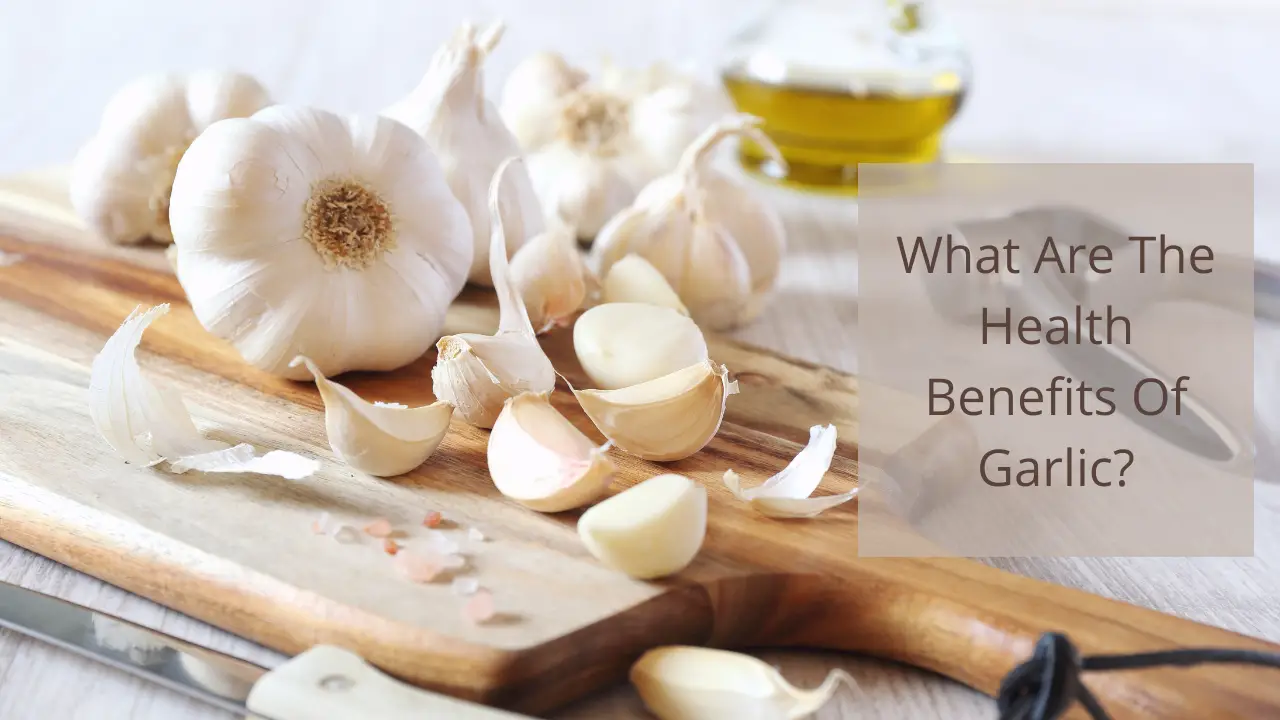Garlic is an essential member of the onion family. The 10-20 cloves in the garlic bulb give every dish a robust smell and taste. Due to this reason, garlic is grown and loved across the globe.
Historians have even found garlic consumption in old civilizations, including Romans, Greeks, Egyptians, and Babylonians. Although garlic has been notorious for bad breath, it has immense health benefits that convince people to use it as a medicine.
This article mainly focuses on both the beneficial and harmful benefits of garlic on our bodies.
Physical Benefits of Eating Garlic:
All vegetables are great for our physical health, with each vegetable having characteristic benefits. Similarly, garlic is well known for its distinctive taste and numerous health benefits. Let's discuss some of these:
Garlic versus common cold:
Our body's immune system is powerful, but it could do with a bit of help.
Eating garlic helps boost the body's immune system against the common cold. According to a survey, daily intake of garlic decreases the risk of catching a cold by 63 percent.

Not only that but eating garlic also improves the cold symptoms and helps the patients recover early. Some studies suggest that eating garlic on an empty stomach is even more effective.
Having a garlic clove hung around the neck of kids or babies is rumored to relieve their congestion.
If you often get sick, regularly eating garlic is worth trying.
Reducing blood cholesterol levels:
Our body contains two types of cholesterol. One which helps control blood pressure or “good” cholesterol. Bad cholesterol has a detrimental effect on the body and can cause cardiovascular disorders. Eating garlic lowers the bad cholesterol, or LDL, by 15 percent.
On the other hand, garlic has no significant impact on good cholesterol or HDL. Hence, having garlic every day reduces the onset of heart diseases significantly and wards off the chance of blood clots.
Combating hypertension and other cardiovascular disorders:
Raised blood pressure, also called hypertension, can cause many heart issues. The active component of garlic has a vital role in controlling blood pressure. Scientists conducted a study and found out that there is sulfur in garlic.
When this sulfur reaches the blood, it undergoes a chemical reaction that expands blood vessels. As a result, the blood pressure stays regulated.
Research reveals that a high dietary intake of garlic is as adequate as Atenolol, which reduces blood pressure. These benefits of garlic make it a promising agent for combating and preventing heart attacks and strokes.
Better digestion:
Nutritionists and weight loss consultants set off to perform experiments when they heard rumors about garlic helping weight loss. After research, they found out that these rumors were true.
Eating garlic stimulates the digestive system and enhances digestion, which helps in effectively reducing weight. Moreover, garlic proves beneficial in treating stomach issues like diarrhea. The antimicrobial properties of garlic kill the harmful bacteria that cause food poisoning while protecting the good bacteria.

Garlic also removes worms from the small intestine. In addition, garlic goes a long way in treating indigestion. You can eat a clove of garlic along with a pinch of salt and baking soda for abdominal discomfort and heartburn.
Hip osteoarthritis:
Hip osteoarthritis is a common disorder seen chiefly in aged females. In addition to the medicinal treatment, doctors also advise eating garlic regularly. Garlic contains a high quantity of allium, which mainly helps alleviate the symptoms of arthritis. In addition to garlic, many vegetables, such as onions, leeks, and rakkyo, are also a rich source of allium.
Another group of researchers set off to find whether allium plays any part in preventing hip osteoarthritis. After an extensive study, they found that garlic helps prevent the onset of this disorder, along with these vegetables.
Preventing Cancer:
It is known that cancer is the leading cause of death worldwide. Although there is no proper cure for cancer yet, doctors and researchers have developed several preventive measures. Garlic effectively prevents lung cancer, breast cancer, prostate cancer, and colon cancer.
Scientists conducted a seven-year-long study to prove that eating garlic reduces the risk of lung cancer by 44 percent. The organic compounds of sulfur in garlic destroy the cancer cells in a brain tumor. The allium in garlic and similar vegetables helps reduce the risk of prostate cancer in men.
Liver injury:
A healthy body requires a proper, functional liver. When the liver is damaged, the whole body suffers from it. Excessive alcohol intake is one of the most common causes of liver injury. After research, scientists found out that the organic compounds of garlic prove effective in protecting the liver from alcohol-induced damage.
Premature delivery:
Sometimes, pregnant women may face complications because they are forced to undergo a premature delivery. But these women, along with their babies, are at a very high risk of bacterial infections. To reduce these risks, doctors suggest a regular dietary intake of garlic.

Garlic is rich in allium, possesses antimicrobial properties, and kills harmful bacteria. Numerous studies support this theory that garlic and dried fruits greatly help reduce preterm delivery risks.
Garlic, brain, and dementia:
Everyone wants to stay young, healthy, and fit. But unfortunately, our body experiences oxidative damage from free radicals, which speeds up the aging process. Garlic is a wonderful source of antioxidants, which bolster the body's defense mechanisms that negate the effect of free radicals.
This antioxidant property and reducing blood pressure and cholesterol levels, as discussed earlier, improve brain function—moreover, garlic wards off any risk of neurodegenerative disorders such as Alzheimer's disease and dementia.
Enhanced athletic performance:
Using garlic to improve physical fitness has been a tradition since ancient cultures. Earlier, people performing physical labor took garlic to improve efficiency and reduce fatigue.
After the Olympics, Greek athletes started using garlic to boost their athleticism and to perform better. Garlic even improves the peak heart rate in patients with cardiac failure. If you feel tired after light or moderate exercise, try eating garlic to get an endurance boost.
Increased bone strength:
Estrogen is a hormone released in females. After menopause, its excretion significantly decreases, which leads to bone loss, osteoporosis, and osteoarthritis. Eating garlic enhances estrogen release, which markedly increases bone strength. So, if you're an aged female, start adding garlic seasonings to improve your bone health.
Potential Adverse Effects:
Although garlic has some exceptional health benefits, it can also cause several issues, as every coin has two sides. Here are some of the potential adverse effects that come with eating garlic.
Gastrointestinal issues:
Consuming garlic, especially on an empty stomach, may not serve well with our gastrointestinal tract. According to the National Cancer Institute of the United States, eating garlic can lead to nausea, vomiting, bloating, and gas.

For this purpose, people who follow a low FODMAP diet are also advised to reduce garlic intake.
GERD:
According to the researchers of Harvard Medical School, garlic consists of several compounds that promote the onset of GERD, also known as heartburn. Eating garlic widens the sphincter between the esophagus and the stomach. As a result, the acidic secretions of the stomach enter the esophagus, causing GERD.
Bad breath:
Remember the sulfur in garlic that helped control and maintain blood pressure? The same sulfur is responsible for the notorious bad breath accompanying a garlicky meal. Garlic breath is most pronounced after eating raw garlic since cooking the garlic decreases the sulfur content.
Labor risks for pregnant women:
Garlic helps in premature birth by reducing the risk of complications. But, doctors typically advise pregnant women to avoid garlic, as it can also induce early labor. Moreover, doctors are also against lactating and nursing women eating garlic. The reason behind it is that garlic alters the taste of milk.
Increased risk of bleeding:
Garlic reduces blood pressure and prevents the formation of clots. But if this effect becomes too pronounced, it can lead to bleeding, especially if the patient is taking blood thinners.
Similarly, people undergoing surgery are also advised to avoid eating garlic. A patient once went through extreme discoloration and bruising after going through surgery. The doctors later realized that the patient's diet contained high amounts of garlic.
Allergic reaction:
An anaphylactic shock or Anaphylaxis is the most intense and severe allergic reaction. If a person is allergic to garlic, eating excess garlic can result in an anaphylactic shock. The symptoms of an anaphylactic shock include vomiting, hives, tongue swelling, and circulatory shock.
Other harmful effects:
Other potential risks accompanying a garlicky meal include asthma, rash, skin diseases, and a stuffy nose. Some people even experience pink eye, also called conjunctivitis.
The Defining Factor:
On the one hand, we discussed how garlic helps benefit our body in numerous ways. On the other hand, we also discussed how harmful garlic could be. Both these discussions beg the question; is garlic harmful or beneficial for us?
Well, the answer is pretty simple. The defining factor that determines whether garlic is excellent or bad for health is the amount of dietary intake. Like every other food item, if garlic is eaten in excess, it will cause serious health issues. But if this limit is not exceeded, eating garlic can work wonders for our bodies.

So, what amount of garlic is allowed and does not exceed the maximum limit? Well, there isn't a fixed, specified value as the opinions and guidelines of each doctor vary from patient to patient.
According to some studies, eating 1-2 cloves or 3-6 grams each day can help reap most of the benefits of garlic. Several researchers consider 300mg of dried garlic powder tablet as the optimum amount.
Many others think one should not eat more than 7.2g of aged garlic extract in a day. If these limits are crossed, overeating garlic can cause adverse effects.
Should You Eat Raw Garlic?
This discussion takes us to our next question. Is eating raw garlic safe for health? Most recipes either include garlic in cooked form or require powdered. But that does not mean a person can't eat it in raw form. It is entirely safe for consumption and has no such harmful effects when taken in a reasonable quantity.
If you ever compare raw garlic with the one that's cooked, you'll find that the latter has a different taste. Moreover, cooked garlic has a softer, creamier, and milder texture. On the other hand, raw garlic has a robust, intense flavor that makes it an excellent choice for adding to several dishes. Moreover, cooking garlic removes some of the essential components of the vegetable.
Some famous healthy garlic dishes:
Garlic has been a vital part of some of the most exquisite dishes. You might've seen raw garlic in dressings, dips, soups, and pesto sauces. Adding garlic to guacamole and bruschetta brings these dishes to a whole different level.
You can even roast garlic cloves to enjoy a tasty meal. Whip up some gluten-free garlic bread and find yourself licking your fingers afterward.
Should You Eat Organic Garlic?
Eating organic garlic grown in the United States is a must! Garlic grown in China is bleached and grown in sewer water, making it unhealthy to consume. China also produces the most garlic worldwide.
Organic garlic that is grown in the United States is a healthier option since it is void of chemicals, pesticides, and no GMOs. Always look for the USDA Certified Organic label.
Conclusion:
Garlic has been a vital part of our diet for quite a while. Doctors and nutritionists scrutinize each food item with advancements in science and medicine.
Garlic's health benefits and adverse effects were thoroughly studied like these food items. When eaten in average amounts, eating garlic helps enhance the function of the heart and brain.
Additionally, it wards off the risk of some fatal diseases. On the contrary, excessive garlic intake can have some severe complications. Hence, it is vital to eat an adequate amount of garlic to reap its benefits.
Always opt for organic garlic when purchasing in your local supermarket, or buy from your local farmer's market.






